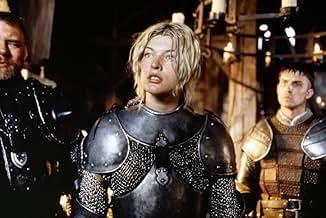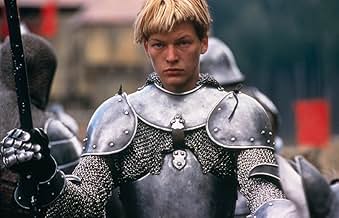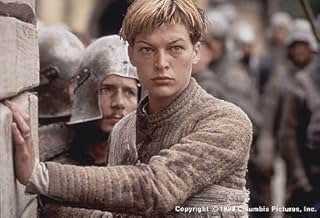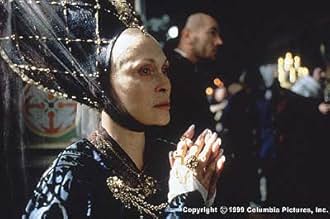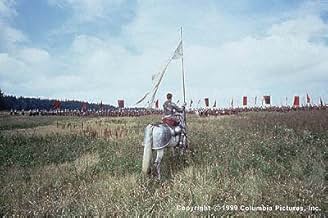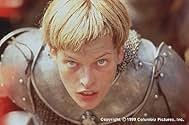IMDb RATING
6.4/10
72K
YOUR RATING
A young girl receives a vision that drives her to rid France of its oppressors.A young girl receives a vision that drives her to rid France of its oppressors.A young girl receives a vision that drives her to rid France of its oppressors.
- Awards
- 5 wins & 13 nominations total
Stéphane Algoud
- Look Out
- (as Stephane Algoud)
- Director
- Writers
- All cast & crew
- Production, box office & more at IMDbPro
Featured reviews
I loved this movie. It's visually stunning and the casting and acting was superb. The story was already layed out (approximately), so Luc Besson concentrated on Jeanne herself, the person and what she was like and why she did what she did.
I have to admit to putting myself in Jeanne's place, feeling what she must have been feeling along the way. I think without that, it probably would have been a much duller movie, although probably entertaining.
The battles scenes, of which there were many, were graphic and brutal. Dismemberments, swords and maces swinging, lots of pain and death. The ensuing desolation at the end of a battle were weighty and gave a a horrible look at the conditions of the time.
My final impressions... Joan of Arc, if the portrayals were accurate was a driven young woman, deeply religious and deeply confused who was probably at least partially insane. If she were alive today, no doubt, she would be treated with common drugs and would lead a normal life. I felt very sorry for her and her situation and for the way that she was treated. I know people would argue that there is no need to feel this way, because she was clear and sure of her purpose. I don't feel that this was ever the case and she was sure only that she was going crazy if she didn't do something.
Movies don't usually move me this way and I'm really amazed.
I have to admit to putting myself in Jeanne's place, feeling what she must have been feeling along the way. I think without that, it probably would have been a much duller movie, although probably entertaining.
The battles scenes, of which there were many, were graphic and brutal. Dismemberments, swords and maces swinging, lots of pain and death. The ensuing desolation at the end of a battle were weighty and gave a a horrible look at the conditions of the time.
My final impressions... Joan of Arc, if the portrayals were accurate was a driven young woman, deeply religious and deeply confused who was probably at least partially insane. If she were alive today, no doubt, she would be treated with common drugs and would lead a normal life. I felt very sorry for her and her situation and for the way that she was treated. I know people would argue that there is no need to feel this way, because she was clear and sure of her purpose. I don't feel that this was ever the case and she was sure only that she was going crazy if she didn't do something.
Movies don't usually move me this way and I'm really amazed.
Luc Besson directs and Milla Jovovich stars as the Maid Of Orleans who lifted France of its knees-and was tried and executed for being a heretic. The End.
Well that's what you would think all Besson's film amounts too, given the hate and general negativity that pours down on it from many of the worlds cinematic sources. Well, look, it's not brilliant, but is it really the devil that many have painted it as? Not so say I. It's about as subtle as a sledgehammer all told, but Besson's study of the iconic/infamous waif who did indeed expel the British hoards has gusto by the shed load. He nicely crafts the 15th century lands from which to tell his story, and then, to quote someone from another period epic, unleashes hell. Literally. Yep the British armies are stereotypically vile {I bet Mel Gibson loves the Brit portrayals here}, and the blood that is shed is vicious and borderline sick. But it works well in the context of Jeanne's prominent rise and subsequent fall, with her religious confliction deftly blending in with the blood being shed in the pursuit of liberation. Visually the film is a treat, and for action construction it holds up to be one of the better modern day historical epics in that department. But where's the substance?
Ah, there's the big problem with the movie. Besson and his co-writer Andrew Birkin are so pre-occupied with the horrors of war and Jeanne's leadership qualities, they turn the rest of the film into a skeleton in need of flesh. And it's actually Jovovich who suffers the most. She's great when she's screaming and launching into the enemy, taking an arrow hit with grace and dedication . But there's been no character depth laid out, so Jovovich's Jeanne just comes across as a moody teenager out to cause trouble. We need to have some insight into her troubled predicament and what drives her on, not the scantily written filler moments that actually are just appetisers to blood letting battles. There 's also annoyances when the film slips into moments of modern day speak, it's a crass and lazy oversight by the makers to think that we wouldn't notice such speak in 15th Century France. Besson surrounds Jovovich with some fine acting talent tho, even if some are a tad underused. Rolling out are John Malkovich, Dustin Hoffman, Faye Dunaway, Vincent Cassel, Timothy West, Desmond Harrington and the always watchable, and scary, Tcheky Karyo.
So a bit hollow it be, but on the outside it's a ripper. Visceral, explosive and yes, fun too. 7/10
Well that's what you would think all Besson's film amounts too, given the hate and general negativity that pours down on it from many of the worlds cinematic sources. Well, look, it's not brilliant, but is it really the devil that many have painted it as? Not so say I. It's about as subtle as a sledgehammer all told, but Besson's study of the iconic/infamous waif who did indeed expel the British hoards has gusto by the shed load. He nicely crafts the 15th century lands from which to tell his story, and then, to quote someone from another period epic, unleashes hell. Literally. Yep the British armies are stereotypically vile {I bet Mel Gibson loves the Brit portrayals here}, and the blood that is shed is vicious and borderline sick. But it works well in the context of Jeanne's prominent rise and subsequent fall, with her religious confliction deftly blending in with the blood being shed in the pursuit of liberation. Visually the film is a treat, and for action construction it holds up to be one of the better modern day historical epics in that department. But where's the substance?
Ah, there's the big problem with the movie. Besson and his co-writer Andrew Birkin are so pre-occupied with the horrors of war and Jeanne's leadership qualities, they turn the rest of the film into a skeleton in need of flesh. And it's actually Jovovich who suffers the most. She's great when she's screaming and launching into the enemy, taking an arrow hit with grace and dedication . But there's been no character depth laid out, so Jovovich's Jeanne just comes across as a moody teenager out to cause trouble. We need to have some insight into her troubled predicament and what drives her on, not the scantily written filler moments that actually are just appetisers to blood letting battles. There 's also annoyances when the film slips into moments of modern day speak, it's a crass and lazy oversight by the makers to think that we wouldn't notice such speak in 15th Century France. Besson surrounds Jovovich with some fine acting talent tho, even if some are a tad underused. Rolling out are John Malkovich, Dustin Hoffman, Faye Dunaway, Vincent Cassel, Timothy West, Desmond Harrington and the always watchable, and scary, Tcheky Karyo.
So a bit hollow it be, but on the outside it's a ripper. Visceral, explosive and yes, fun too. 7/10
There are many deviations from the accepted facts of Jeanne d'Arc's life as set out in her trial documentation and the writings of the time. This said, the central question of whether she was a saint, an inspired lunatic, wholly mentally ill, or simply a headstrong girl determined to grab her chances while she could is well asked. Many of the comments here assert that Besson makes it clear that the Maid was simply mentally ill, yet I read the film as deeply ambivalent about what was going on. Were her visions the hallucinations of a schizophrenic? Were they given by God? What's the difference? More questions are asked: Why does an omnipotent, omniscient, all-compassionate deity allow terrible things to happen? What is the meaning of kingship - to own or to serve? What is the difference between taking the lives of individuals and killing en masse? What's the difference between Christianity and the earthly institutions of that religion? Where does conviction end and fanaticism begin?
Jovavich's Jeanne is plagued by the difference between her idea of utter submission to God and the consequences of doing so; by doubt over the veracity of her visions; and by the gap between her ideals of the divine rights of kings and realpolitik. She is constantly on the verge of a nervous breakdown - is this a manifestation of her mental illness, or of her "burning for God"? And where's the difference between the two?
The film raises more questions than it answers, and that's as it should be. It is something of a shame that Besson's film takes liberties with the facts as we understand them (though history is more often about our interpretation of events than the events themselves), but in terms of raising important questions on the nature of faith, it succeeds beyond measure.
Jovavich's Jeanne is plagued by the difference between her idea of utter submission to God and the consequences of doing so; by doubt over the veracity of her visions; and by the gap between her ideals of the divine rights of kings and realpolitik. She is constantly on the verge of a nervous breakdown - is this a manifestation of her mental illness, or of her "burning for God"? And where's the difference between the two?
The film raises more questions than it answers, and that's as it should be. It is something of a shame that Besson's film takes liberties with the facts as we understand them (though history is more often about our interpretation of events than the events themselves), but in terms of raising important questions on the nature of faith, it succeeds beyond measure.
I found Luc Besson's take on the story of Joan of Arc thoroughly compelling. Like all of Besson's films, The Messenger is highly stylized, nicely cast, and visually powerful. The film is also forgivably anachronistic in terms of language while developing a strong period feel through sets and costume.
Joan was, of course, the deeply religious teenage girl who lead Prince Charles' army to improbable victory over the invading English at Orleans and helped re-consolidate French sovereignty. Joan considered herself God's appointed messenger, and France apparently saw her as an avenging angel. Today, she is commonly regarded as a schizophrenic. She was canonized in the 1950s, 500 years after her death. Regardless of whether God or insanity was the source of her strength, power, will and incredible courage - there is little ambiguity about her role in the salvation of France nor the fate that awaited her afterward.
In general, the acting is quite good. Jovovich's much-maligned performance is actually very good and exactly appropriate for what Besson was trying to do with the film. Comparing Joan of Arc to her other Messianic role as Leelu in the Fifth Element is, frankly, ridiculous. I believe that the problems people find in Jovovich's performance are problems those same people bring to the film. Malkovich and Dunaway are phenomenal. Tcheky Karyo and Vincent Cassell provide excellent support.
Besson strays from what we think we know about the details of Joan's story, but only to present the truth of the big-picture more accurately. His film steadfastly refuses to answer the questions many people will bring to it:
* Was Joan schizophrenic? * Was she a catholic messiah or divinely inspired prophet?
Why is Besson so careful about accurately presenting the ambiguity of the story? I think he wanted to make a moving film, but not a film which would unsubtly challenge its audience's beliefs. If you do not believe, you will tend to explain Dustin Hoffman's character as a manifestation of Joan's psychological problems. If you do believe, you may want to think of him as Satan, am angel, perhaps both. Thus, Besson, who is a deeply spiritual person, makes a powerful statement about faith through his metanarrative while maintaining an appropriately unevangelical position. He took similar paths in his more uplifting films The Fifth Element and Angel-A.
Highly recommended for Besson and Jovovich fans. Not a biography - avoid this if you must have the "plain" facts! Mildly recommended as a piece of historical fiction.
Joan was, of course, the deeply religious teenage girl who lead Prince Charles' army to improbable victory over the invading English at Orleans and helped re-consolidate French sovereignty. Joan considered herself God's appointed messenger, and France apparently saw her as an avenging angel. Today, she is commonly regarded as a schizophrenic. She was canonized in the 1950s, 500 years after her death. Regardless of whether God or insanity was the source of her strength, power, will and incredible courage - there is little ambiguity about her role in the salvation of France nor the fate that awaited her afterward.
In general, the acting is quite good. Jovovich's much-maligned performance is actually very good and exactly appropriate for what Besson was trying to do with the film. Comparing Joan of Arc to her other Messianic role as Leelu in the Fifth Element is, frankly, ridiculous. I believe that the problems people find in Jovovich's performance are problems those same people bring to the film. Malkovich and Dunaway are phenomenal. Tcheky Karyo and Vincent Cassell provide excellent support.
Besson strays from what we think we know about the details of Joan's story, but only to present the truth of the big-picture more accurately. His film steadfastly refuses to answer the questions many people will bring to it:
* Was Joan schizophrenic? * Was she a catholic messiah or divinely inspired prophet?
Why is Besson so careful about accurately presenting the ambiguity of the story? I think he wanted to make a moving film, but not a film which would unsubtly challenge its audience's beliefs. If you do not believe, you will tend to explain Dustin Hoffman's character as a manifestation of Joan's psychological problems. If you do believe, you may want to think of him as Satan, am angel, perhaps both. Thus, Besson, who is a deeply spiritual person, makes a powerful statement about faith through his metanarrative while maintaining an appropriately unevangelical position. He took similar paths in his more uplifting films The Fifth Element and Angel-A.
Highly recommended for Besson and Jovovich fans. Not a biography - avoid this if you must have the "plain" facts! Mildly recommended as a piece of historical fiction.
My first Milla Jovovich movie was Ultraviolet, which has spawned more "worst movie ever" threads on IMDb than any other. Well, I wouldn't call it that bad, but still... it hardly gave me any faith in Milla's career as a dramatic performer.
So I popped this flick in the DVD player not expecting much. Sacrée merde! What a surprise. It seems, stripped of her futuristic-mutant-motorcycle-riding-vampire persona, she's really quite good. This film--probably the least glamorous of her entire repertoire--really gives her a chance to show her full dynamics. I can't say much more without giving away the plot, so I'll drop it for now.
Now on to the director Luc Besson. For the first half hour or so, he seems to suffer from "I wanna be Kenneth Branagh" syndrome (which is almost as painful as the avian flu). We get a dozen scenes of someone running down a corridor with the camera chasing behind. We get a dozen overhead-camera-twirly shots of someone lying on the ground. We get so many crane shots, you start thinking you're on a construction site. What's wrong with all this? I'll tell you. When the camera swings & sways too much it detracts from the actors' performances. Sure it adds visual drama, but so can a good fireworks scene (with just as much subtlety).
But suddenly, right around the halfway mark, the camera man simmers down. The whole tone of the film changes, becomes darker and more intense, relying on the power of the actors instead of the gimmicky camera-work. This works brilliantly, especially when Dustin Hoffman finally steps in.
This is the break that takes the movie in an entirely different (and possibly offensive) direction. It looks like some IMDb reviewers weren't too happy. I'm sure plenty of others got bored (because the swordfights stop). But me, I thought this change of mood was what made the movie. Suddenly it becomes a spooky, psychological thriller with a lot of great dialogue and a ton of good acting. THIS is the payoff.
My biggest gripe with the movie is that after seeing the 2nd half, I kept saying to myself "why the hell did Besson waste so much time getting here?" There were a few too many insignificant fluff scenes in the beginning (like the virginity test lol) that should have been replaced with more of the powerful Milla-Dustin dialogue toward the end.
I won't comment on historical accuracy, religious sacrilege, lack-of-realism or the fact that there were a few too many American accents for 15th century France. These flaws fall by the wayside if you're instead paying attention to the complex conflict brewing in Milla's character. This is really her movie, and a damn good one at that. Like my title implies, it's good enough to make me want to give Ultraviolet another try.
So I popped this flick in the DVD player not expecting much. Sacrée merde! What a surprise. It seems, stripped of her futuristic-mutant-motorcycle-riding-vampire persona, she's really quite good. This film--probably the least glamorous of her entire repertoire--really gives her a chance to show her full dynamics. I can't say much more without giving away the plot, so I'll drop it for now.
Now on to the director Luc Besson. For the first half hour or so, he seems to suffer from "I wanna be Kenneth Branagh" syndrome (which is almost as painful as the avian flu). We get a dozen scenes of someone running down a corridor with the camera chasing behind. We get a dozen overhead-camera-twirly shots of someone lying on the ground. We get so many crane shots, you start thinking you're on a construction site. What's wrong with all this? I'll tell you. When the camera swings & sways too much it detracts from the actors' performances. Sure it adds visual drama, but so can a good fireworks scene (with just as much subtlety).
But suddenly, right around the halfway mark, the camera man simmers down. The whole tone of the film changes, becomes darker and more intense, relying on the power of the actors instead of the gimmicky camera-work. This works brilliantly, especially when Dustin Hoffman finally steps in.
This is the break that takes the movie in an entirely different (and possibly offensive) direction. It looks like some IMDb reviewers weren't too happy. I'm sure plenty of others got bored (because the swordfights stop). But me, I thought this change of mood was what made the movie. Suddenly it becomes a spooky, psychological thriller with a lot of great dialogue and a ton of good acting. THIS is the payoff.
My biggest gripe with the movie is that after seeing the 2nd half, I kept saying to myself "why the hell did Besson waste so much time getting here?" There were a few too many insignificant fluff scenes in the beginning (like the virginity test lol) that should have been replaced with more of the powerful Milla-Dustin dialogue toward the end.
I won't comment on historical accuracy, religious sacrilege, lack-of-realism or the fact that there were a few too many American accents for 15th century France. These flaws fall by the wayside if you're instead paying attention to the complex conflict brewing in Milla's character. This is really her movie, and a damn good one at that. Like my title implies, it's good enough to make me want to give Ultraviolet another try.
Did you know
- TriviaMost of the characters, including Joan's Captains, were real people. Giles de Rais was a real person who, after the war and Joan's death, retired to his lands. Many years later, he was arrested for the murder of more than 100 young boys, and executed. Some historians believe that his crimes were the basis for the French fairy tale "Bluebeard," about a rich man who murders his wives and hides their bodies in his grand house.
- GoofsJoan's older sister was not murdered by soldiers, but survived to adulthood and married. She died ultimately in childbirth.
- Quotes
[In questioning Joan regarding all the gifts that King Charles VII bestowed upon her]
Priest: What about all these dresses you were given? Silk dresses, weren't they?
Joan of Arc: Yes, I was given a few, but I never had time to wear them.
Priest: Still... pretty wealthy for a peasant girl, wouldn't you say?
Joan of Arc: You look pretty wealthy to be a servant of God, wouldn't you say?
- Alternate versionsThe European release was 10 minutes longer than the US theatrical version, which omits, among others, the scene where Joan's virginity is tested before the court of King Charles VII. The longer version has been released in the USA on DVD.
- SoundtracksMy Heart Calling
Lyrics and Music by Éric Serra and Achinoam Nini
Produced by Éric Serra
Performed by Achinoam Nini
With the Special Authorization of Interscope/Geffen
- How long is The Messenger: The Story of Joan of Arc?Powered by Alexa
Details
- Release date
- Countries of origin
- Languages
- Also known as
- Juana de Arco
- Filming locations
- Bruntal, Czech Republic(Fort of the Tourelles)
- Production companies
- See more company credits at IMDbPro
Box office
- Budget
- $85,000,000 (estimated)
- Gross US & Canada
- $14,276,317
- Opening weekend US & Canada
- $6,360,968
- Nov 14, 1999
- Gross worldwide
- $66,976,317
- Runtime
- 2h 28m(148 min)
- Color
- Sound mix
- Aspect ratio
- 2.39 : 1
Contribute to this page
Suggest an edit or add missing content



